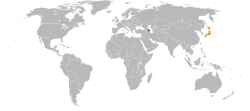The State Oil Company of the Republic of Azerbaijan, largely known by its abbreviation SOCAR, is a fully state-owned national oil and gas company headquartered in Baku, Azerbaijan. The company produces oil and natural gas from onshore and offshore fields in the Azerbaijani segment of the Caspian Sea. It operates the country's only oil refinery, one gas processing plant and runs several oil and gas export pipelines throughout the country. It owns fuel filling station networks under the SOCAR brand in Azerbaijan, Turkey, Georgia, Ukraine, Romania, Switzerland, and Austria.
Azeri–Chirag–Gunashli or Azeri–Chirag–Deepwater Gunashli is a complex of oil fields in the Caspian Sea, about 120 kilometres (75 mi) off the coast of Azerbaijan. It consists of the Azeri and Chirag oil fields, and the deepwater portion of the Gunashli oil field. An overall estimate of the area of the development is 432.4 square kilometres (167.0 sq mi). It is developed by the Azerbaijan International Operating Company, a consortium of international oil companies, and operated by BP on behalf of the consortium. The ACG fields have estimated recoverable reserves of about 5 to 6 billion barrels of petroleum. Peak oil production of 835,000 barrels per day (132,800 m3/d) was reached in 2010, however by the first quarter of 2022 production had declined to 434,000 barrels per day (69,000 m3/d), or about one-half of peak value. As of 2021, ACG oil accounted for 95% of all Azerbaijani oil exports.

Relations have always been strong between Azerbaijan and Turkey, the only two predominantly Turkic countries located west of the Caspian Sea. Former Azerbaijani president Heydar Aliyev often described the two as being "one nation, two states."
Azerbaijan International Operating Company is a consortium formed to implement the terms of the “Agreement on the Joint Development and Production Sharing for the Azeri and Chirag Fields and the Deep Water Portion of the Gunashli Field in the Azerbaijan Sector of the Caspian Sea” signed among SOCAR and international companies.

Strong foreign relations exist between the Republic of Azerbaijan and the United Kingdom. The Embassy of United Kingdom in Baku opened in 1992. The Embassy of the Republic of Azerbaijan in London opened in 1994. Both countries are members of the Council of Europe, the Organization for Security and Co-operation in Europe.
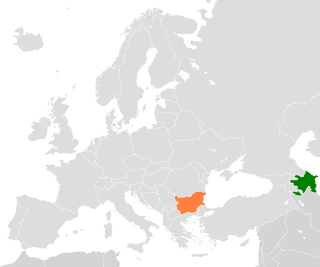
Bilateral relations exist between the Republic of Azerbaijan and the Republic of Bulgaria in political, socio-economic, cultural and other spheres. Cooperation is carried out in such areas as transport and transit of goods, tourism, pharmaceuticals, agriculture, science and high technologies, education, military equipment, etc.
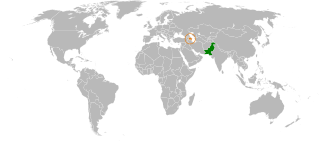
Azerbaijan–Pakistan relations refer to bilaterial relations between the Republic of Azerbaijan and the Islamic Republic of Pakistan. Pakistan has an embassy in Baku and Azerbaijan has an embassy in Islamabad. Both countries are enhancing contact between their respective capitals. The two nations are considered "strategic partners".
Dan Ulduzu field is an oil and gas field located 105 km (65 mi) northeast of Baku, Azerbaijan, west of Karabakh field, in the northern section of Absheron archipelago. In Azerbaijani, Dan Ulduzu means Pole Star.
Ashrafi field is an oil and gas field located 105 km (65 mi) northeast of Baku, Azerbaijan, west of Karabakh field, in the northern section of Absheron archipelago.
North Absheron Operating Company (NAOC) was an international petroleum consortium based in Baku, Azerbaijan created to explore and develop the Dan Ulduzu and Ashrafi prospects in the Azerbaijani sector of the Caspian Sea. The company started its operations in 1997. On March 7, 2000 the company stopped operations after the management of company considered the contract was not financially profitable.
Shafag-Asiman is a large complex of offshore geological structures in the Caspian Sea located 125 km (78 mi) southeast of Baku, Azerbaijan. The Shafag and Asiman structures have been previously called D8 and D10, respectively.

Azerbaijan-India relations are the bilateral relations that exist between the Republic of Azerbaijan and the Republic of India.

Diplomatic relations between the Republic of Azerbaijan and the People's Republic of China were established on April 2, 1992. The relations between the two countries have developed smoothly and high-level exchanges have been close. The PRC embassy in Baku openly commends Azerbaijan for supporting its stance on the political status of Taiwan, Tibet's sovereignty, the conflict in Xinjiang, and the suppression of Falun Gong. All political forces have actively advocated strengthening friendly cooperation with China. China was one of the first countries to recognize independence.

Diplomatic relations exist between Azerbaijan and the Netherlands. Azerbaijan have an embassy in The Hague. the Netherlands has an embassy in Baku. Both countries are full members of the Council of Europe.
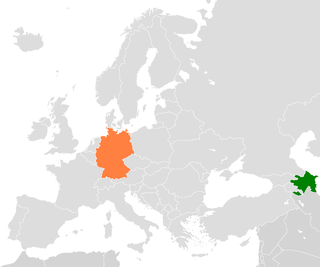
The diplomatic relations between Azerbaijan and Germany established in 1992 after Germany recognized the independence of Azerbaijan.
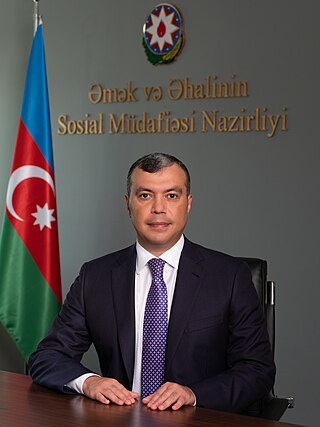
Mr. Sahil Babayev is the Minister of Labour and Social Protection of Population of the Republic of Azerbaijan, President of the National Boxing Federation, Co-chairman of the Intergovernmental Commission on trade and economic cooperation between Azerbaijan and Serbia on Azerbaijani side, Co-chairman of the Joint Commission on Economic Cooperation between the Governments of Azerbaijan and Hungary on Azerbaijani side], Co-chairman of the Joint Commission on Trade, Economic, Scientific, Technical and Cultural Cooperation between the governments of Azerbaijan and Romania from Azerbaijani side, Co-chairman of the Joint Commission on Economic Cooperation between Government of the Republic of Azerbaijan and Government of the Republic of Montenegro on Azerbaijani side.

Bilateral relations exist between the Republic of Azerbaijan and the Republic of Colombia in political, socio-economic, cultural and other spheres.

Azerbaijan–Morocco relations are the bilateral relations between Azerbaijan and Morocco. Azerbaijan has an embassy in Rabat. Morocco has an embassy in Baku.
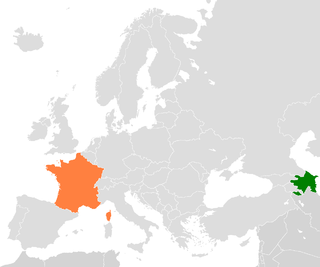
Azerbaijan—France relations are the bilateral relations between the Republic of Azerbaijan and the French Republic in the political, socio-economic, cultural, and other spheres.
Jirtdan is an Azerbaijani animated film created by Elchin Effendiev and Aghanagi Akhundov at the Azerbaijanfilm studio in 1969. It is one of the first Azerbaijani animated films, and is the first film shot after the restoration of the studio's animation workshop in 1968. On the 28th of February, 1969, work on Jirtdan was completed and the film was finally released on screens in 1969.
